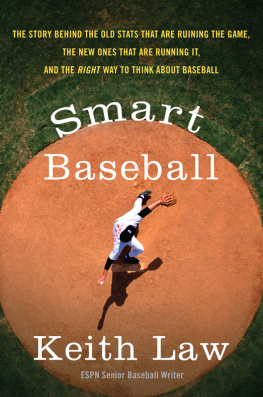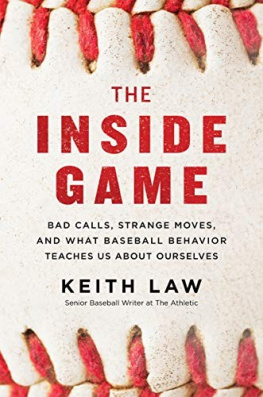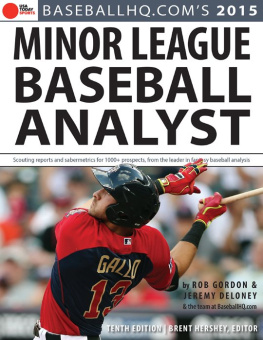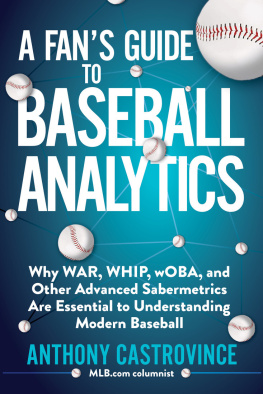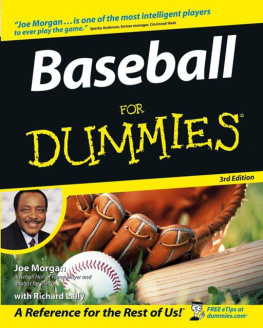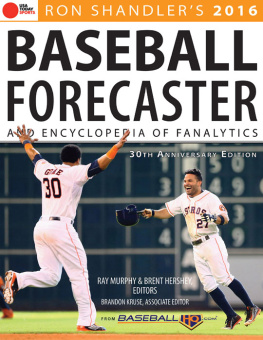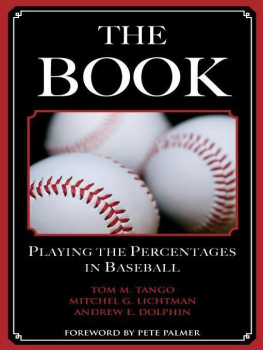To my wife, Christa, and my daughter, Kendall Joy
Contents
L ike many of you, I imagine, I grew up in a Pleasantville-esque world of baseball statistics, where everything you might want to know about a baseball player was displayed in tabular form on the back of his baseball card (until you destroyed it by flipping it against a brick wall or sticking it in the spokes of a bicycle tire). A hitters home runs, average, and RBI were right there, along with the obscure and intimidating OBP and SLG. A pitchers won-lost record, saves, and ERA were shown, along with strikeouts, innings, and the undefined GS, which for a few of my elementary school years I could only assume meant grand slams, which never made mathematical sense to me. (It means games started.) I was born in 1973 and the eighties were my formative years as a fan. For most of that time, it didnt even occur to me that there might be more information out there to learn about players performances, or that the stats were birthed from the sanctum sanctorum of baseball accounting. This was what there was, and if it was good enough for Topps and Newsday and WPIX, it was good enough for me.
Of course, there came a point where I realized that these stats werent doing a particularly good job of telling me what was happening on the field or helping me predict what players might do in the future. I played fantasy baseball for thirteen years, from my senior year of high school (1990) until my first year as a front office employee of the Toronto Blue Jays, and in the first few years of playing, I was awful at it. I founded the league and finished dead last. I thought being good at math gave me some kind of advantage at the game, but it turned out it gave me a lot of false confidence and nothing else.
Eventually, the desire to be better at a frivolous endeavorwe never played for moneydrove me to seek out some new perspectives on baseball, which led me to the small but active online sabermetrics community of the time, and eventually to books like Baseball Prospectus and works by Bill James and Eddie Epstein. None of these were specifically guides to statistics, but they all looked at the game a different way, often incorporating new statsJames was a sort of Thomas Edison of the field, generating new stats as easily as most of us breatheto tell the reader something new about a player. The more I read, the more I wanted to read. Baseball had always been my favorite sport, likely because it was my parents favorite and my grandmothers as well, but now I could watch and follow the sport with a totally new set of eyes.
In the twenty years since I first wrote my first public piece on baseball, in 1996, the field of baseball analysis has undergone a quantum-state change, going from one or two consultants providing statistical insight to a handful of interested teams to all thirty clubs employing departments of full-time quants. Where media coverage of baseball in the 1990s was homogeneous in people and in content, today it is exploding with diversity of faces, voices, and opinions. This revolution has had, at its heart, the rising adoption of statistical analysis within and around the game. If you said OBP was better than batting average in 1996, youd be looked at as if you were a little strange. If you say it now, youll be asked why youre not looking at wOBA or wRC+ instead.
Why has baseball as an industry, including the media covering it and the fans who follow it, stuck with outdated statistics for so long? The answer is largely a giant appeal to tradition, a common type of fallacious argument that says we should keep doing it this way because weve always done it this way. Baseball has always suffered from a sort of inertia. Whether its about the rules of the game, replay, or the unwritten code of player behavior, old ideas are hard to unseat. For too long people have put faith in old numbers and stats precisely because theyre old; these are the numbers that the baseball gods graced us with all those years ago, so we must follow themeven if there are numbers out there that actually work better. A game with a century and a halfs worth of history has a hard time escaping the gravitational pull of that past.
The fact that baseballs irrational reliance on tradition, gut instinct, and flawed stats continued even as better stats became widely available to everyone isnt just an academic concern. Because allegiance to these old stats is not rooted in accuracy or success, people whove repeatedly failed at their jobs are often given new opportunities to fail some more. Using the wrong measurements has resulted in bad decisions on contracts, playing time, trades, and draft picks. Its led the voters in the Baseball Writers Association of America (BBWAA) to pick the wrong players for MVP, Cy Young, and Rookie of the Year awards, and often to screw up even obvious stuff like which players to put in the Hall of Fame. It drives conversations around teams and playersoften driving the conversations right off a cliff. Even now, in 2017, you will still hear broadcasters refer to and rely on outdated or flat-out useless statistics to try to analyze whats happening on the field, to advocate bad strategies, or to praise a player for doing something that actually wasnt very good. This isnt just an issue for Major League Baseball (MLB)its a problem at all levels of the game. Just go to a college or high school baseball game and watch the bench empty as players rush to congratulate a hitter who just advanced a runner via a bunt or an out. Yay! Were in worse shape than we were a few pitches ago!
But even as commentators, managers, writers, and talking heads have resisted the statistical sea change of the last decade, most front offices around the league have long recognized that these and other numbers lie at the heart of the game precisely because they work better. They describe in-game events with greater accuracy and they predict what players will do in the future with greater accuracy. Baseball might be a sport fueled by nostalgia and adherence to the past, but no team wants to go back to a time when they used to lose more often.
As such, teams evaluate players substantially differently today than they did in 2000, and its time that we as journalists, bloggers, and fans adapt. For that to happen, the conversation has to go beyond merely pointing out that batting average and the pitcher win are bad, into a discussion of what stats are better, allowing us to reframe how we discuss player performance. Communicating that is my main goal in writing this book. (Also money. But mostly communicating that.)
The world of baseball is changing, and has been for some time now, but the mainstream discussion and coverage of the sport has lagged behind the changes within major-league team operations. Youll still read elegies to the pitcher win in your local paper, arguments that poor defenders are actually great because they dont make errors, and managers are brilliant for employing small ball tactics that lead to fewer runs. Theres no reason on earth for any baseball fan to cling to old, anachronistic, or disproven notions like these. I coined the Twitter term #smrtbaseball a few years ago, an homage to a Simpsons joke, to refer to managerial moves and executive comments that were, in fact, the opposite of smart. Ive restored the a to smart here because the point of this book is to try to educate the reader on the way front offices look at player statistics and valuation today, and where their thinking is likely to head in the future.
A s 2016 drew to a close, Major League Baseball was coming off one of its most successful postseasons ever, one full of drama, narratives, and rising young stars, where the Chicago Cubs managed to end the longest championship drought in US professional sports, and did so in no small part because they went from also-rans in the stats department to industry leaders. You couldnt watch or follow the 2016 playoffs without noticing, reading, or hearing about the statistical revolutionplayers Wins Above Replacement values, defensive positioning, advanced fielding metrics like Ultimate Zone Rating, and the use of leverage to determine when to use your best reliever. This was unthinkable when I first started dabbling in baseball analysis in my early twenties. Its now standard, with every MLB owner who wasnt already on board looking at the most successful teams the last few seasons and realizing that if they didnt add this capability in-house theyd only fall further behind their direct competitors.
Next page
